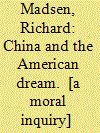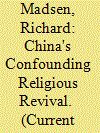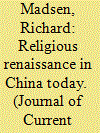| Srl | Item |
| 1 |
ID:
048598


|
|
|
|
|
| Publication |
California, University of California Press, 1995.
|
| Description |
xxiii, 262p.
|
| Standard Number |
9780520086135
|
|
|
|
|
|
|
|
|
|
|
|
Copies: C:1/I:0,R:0,Q:0
Circulation
| Accession# | Call# | Current Location | Status | Policy | Location |
| 040033 | 303.48251073/MAD 040033 | Main | On Shelf | General | |
|
|
|
|
| 2 |
ID:
078585


|
|
|
|
|
| Publication |
2007.
|
| Summary/Abstract |
The government wants to control religion and harness its philanthropic energies to create social stability-until such time as religion can be completely strangled
|
|
|
|
|
|
|
|
|
|
|
|
|
|
|
|
| 3 |
ID:
109118


|
|
|
|
|
| Publication |
2011.
|
| Summary/Abstract |
Since the beginning of the Reform Era in 1979, there has been a rapid growth and development of religious belief and practice in China. A substantial new scholarly literature has been generated in the attempt to document and understand this. This essay identifies the most important contributions to that literature and discusses areas of agreement and controversy across the literature. Along with new data, new paradigms have developed to frame research on Chinese religions. The paradigm derived from C. K. Yang's classic work in the 1960s came from structural functionalism, which served to unite research in the humanities and social sciences. However, structural functionalism has been abandoned by the new generation of scholars. In the humanities, the most popular paradigm derives from Michel Foucault, but there are also scholars who use neo-Durkheimian and neo-Weberian paradigms. In the social sciences, the dominant paradigms tend to focus on state-society relations. None of these paradigms fully captures the complexity of the transformations happening in China. We recommend greater dialogue between the humanities and social sciences in search of more adequate theoretical frameworks for understanding Chinese religions today.
|
|
|
|
|
|
|
|
|
|
|
|
|
|
|
|